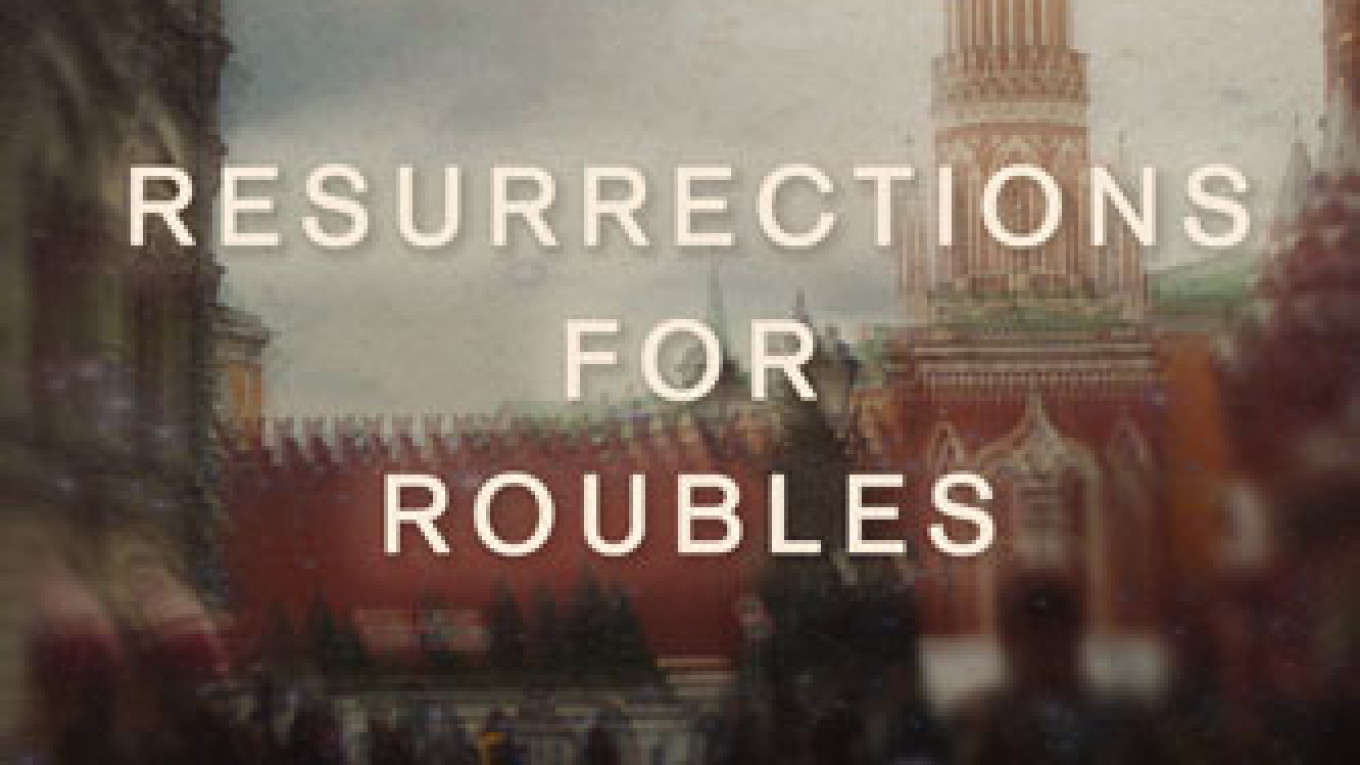An excerpt from "Resurrections for Roubles: Adventures with Modern Russia's Psychics, Sects, and Sorcerers."
When I first moved to Russia in 1997, despite only initially knowing about 10 words of the language, I would buy a couple of papers every morning and attempt to decipher them with the help of my brand-new, Russian-English dictionary. The broadsheets, I figured, would most likely prove too tough to decode, and so I plumped instead for the tabloids. There's nothing quite like the gutter press for getting to the heart of a nation's passions and obsessions, and Russia is no exception.
After I got bored with the sports and celebrity news, I would check out the classified ads. Among the usual dentists, plumbers, and cockroach exterminators, I was surprised to see page after page of advertisements for witches, wizards and psychics, all of them offering to solve my everyday problems for a reasonable sum.
Intrigued by the images of mysterious women in black and serious, slightly menacing sorcerers, I reached for my trusty dictionary. While a more organized student of Russian would undoubtedly have been building his basic vocabulary, learning crucial phrases like "Can I call my embassy?" and "Where can I buy a plug?" I instead spent my time filling my notebooks with occult terms — "vyedma — witch," "koldovstvo — sorcery," "proklyatiye — curse," and so on.
I doubted they would be very helpful, but it was certainly a lot more fun than cramming up on more down-to-earth phrases. I also looked forward to Russians wondering why I was able to say "cast a spell" in their native tongue, but not, for example, "pass me the spoon, please."
As it turned out though, the new additions to my vocabulary weren't quite as useless as I had imagined. In fact, they came in downright handy.
My attraction to the occult ads was born of a more than a minor interest in the subject. One summer in south London, in the quiet and leafy district of Brockley to be precise, I'd forced myself to read from front to back Aleister Crowley's seminal, yet extremely hard-going, "Magick," and I'd devoured a lot of drugs in a sincere attempt to explore the astral realms that the "wickedest man in the world" had described. After all, I reasoned, they had to be more interesting than Brockley. Disappointed with the results of my attempt to escape south London through the power of the drug-addled mind, I left shortly afterwards for the much more tangible and accessible alternate reality that is modern Russia.
It didn't take long for me to realize that the Russians were utterly obsessed with magic and the paranormal. Although it's obviously hard to get exact figures, there are an estimated 100,000-plus professional occultists in Russia, with the business worth, according to some reports, up to $30 billion a year. That's a lot of spells and a lot of cash floating around, whichever way you look at it.
Over a beer, friends would tell me of love spells cast on acquaintances, while in more formal settings businesspeople would confess that they made use of clairvoyants or psychics to aid them in decision-making.
On top of all this, there were the Kremlin-backed psychic healers whose shows had drawn audiences of millions, the dozens of sects scattered across the country's vast wilderness, and the media savvy shamans who never seemed to be out of the news.
Walking home at night through forests of concrete tower blocks, I would picture the occupants of the flats carrying out magical rituals in their bedrooms or casting spells in their living rooms. Flickering shadows behind curtains invariably took on sinister qualities as my imagination, fueled by my longtime love of horror films, ran wild.
Were the old women I saw on the metro with plastic bags full of market produce on their way home to knock up potions in their tiny kitchens? Was that old guy with the beard and the intense eyes a master of the dark arts? After all, if the statistics were right, some of the people I saw every day had to be witches or wizards. Or, at the very least, psychics.
Obviously, though, I tried hard not to stare too much.
But nothing stays novel forever. After over a decade here, I began to take Russia's occult mania for granted. It became, like meter-long icicles, bribe-hungry cops, and the dried squid snacks they sell in my local corner shop, just another part of living and working in Moscow. I recognized, of course, the bizarreness of this widespread willingness to trust in all manner of witches, sorcerers and psychics, but then there is much that is strange and unfathomable about life in Russia, and I rarely stopped to consider its implications. Or, come to that, the reasons behind it.
But all that would soon change. The unwitting architect of my restructuring of attitudes, my personal perestroika if you will, was a Kazakh-born sect leader by the name of Grigory Grabovoi. Or the Second Coming, as he much preferred to be known.
Grabovoi made big news all across Russia in 2004, when he proposed to resurrect, for $1,500 a corpse, the children killed in the Beslan siege, a terrorist atrocity often referred to as the country's very own 9/11. He was taken up on his offer by a number of grieving parents, but no miracles — or, strangely enough, refunds — were forthcoming. He was eventually jailed on fraud charges, but released to howls of media and public outrage in May 2010 after serving just four years.
The story, which involved allegations that the self-proclaimed messiah was a secret Kremlin agent, was complex, poignant, and at times difficult to believe. Much, in fact, like Russia itself.
Grabovoi's promises may have been nothing more, at best, than the heartless exploitation of the recently bereaved, but the scandal went a long way to reviving my interest in the country's occult scene. There was something fundamental here about Russia — a cipher perhaps for the nation's yearning for an all-powerful leader and the paths that desperation (not an entirely alien concept in these parts) can lead people down. It also neatly symbolized the Russians' ability to believe fervently, for a short time at least, in the promise of a brighter day.
Did then the country's many sorcerers, sects and psychics have something invaluable to teach me about my adopted homeland? If I could find the answer to the reasons behind Russia's occult passion would this unlock the larger mystery that was modern day Moscow and beyond? I suspected the answer to both questions was a resounding "da."
And, besides, having put a lot of time and effort into studying Russia's history, politics, language and literature, it seemed like a glaring oversight to remain so uninformed about a topic this integral to the national character.
And so I sat up late one winter evening making a list of my occult targets. Grabovoi and his followers were the first to go down in the notebook I had bought especially for my investigation (as I had already begun to think of it). And then there was Anatoly Kashpirovsky, the legendary Soviet-era psychic healer who had recently made a comeback of sorts. I couldn't forget him.
The names and subjects came fast now. It was as if all Russia's occultists were gathered outside my window, faces pressed against the glass, just begging to be invited in for a cup of sweet black tea and a slice of honey cake.
I felt a shiver of apprehension, though. How would they react to me, these sorcerers and shamans, a foreigner meddling in their world? I wasn't actively looking to prove or disprove their claims, but I couldn't rule out that I might tread on a few toes. What would happen if I offended, say, a genuine psychic?
But despite my worries, I was certain that my voyage to the heart of Russia's occult belief would have its lighter moments. A laugh or two surely awaited me — even if the humor would, I suspected, be decidedly dark.
I put my pen down and closed my notebook. The sorcerers, psychics and sect leaders retreated from my window, vanishing slowly into the Moscow night. But I wasn't concerned. I hoped to see them all again very soon.
"Resurrections for Rubles: Adventures with Modern Russia's Psychics, Sects, and Sorcerers" by Marc Bennetts is available as a Kindle book on Amazon.
Contact the author at [email protected]
A Message from The Moscow Times:
Dear readers,
We are facing unprecedented challenges. Russia's Prosecutor General's Office has designated The Moscow Times as an "undesirable" organization, criminalizing our work and putting our staff at risk of prosecution. This follows our earlier unjust labeling as a "foreign agent."
These actions are direct attempts to silence independent journalism in Russia. The authorities claim our work "discredits the decisions of the Russian leadership." We see things differently: we strive to provide accurate, unbiased reporting on Russia.
We, the journalists of The Moscow Times, refuse to be silenced. But to continue our work, we need your help.
Your support, no matter how small, makes a world of difference. If you can, please support us monthly starting from just $2. It's quick to set up, and every contribution makes a significant impact.
By supporting The Moscow Times, you're defending open, independent journalism in the face of repression. Thank you for standing with us.
Remind me later.







